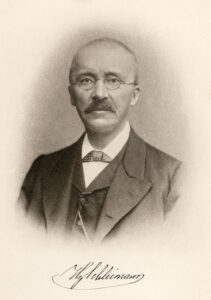Learning Methods
Heinrich Schliemann’s Method for Learning German

Heinrich Schliemann, (January 6, 1822, Neubukow/Germany – December 26, 1890, Naples/Italy)
He is one of the world’s best-known archaeologists and was a pioneer of field archaeology. He was self-taught in language learning. In addition to German, English, French, Dutch, Russian and Greek, he also spoke fluent Spanish, Portuguese, Italian and Arabic. He taught himself all of these languages. How did he do that? – The first language he learned was English. His method, we read, was “to read a lot in a loud voice, not to do any translations, to take a lesson every day, to always write down elaborations on subjects of interest to us, to improve them under the teacher’s supervision, to learn them by heart and to recite in the next lesson what he had improved the day before” (Schliemann 1869, IX). In order to acquire correct pronunciation, he also regularly attended English church services and read Walter Scott’s Ivanhoe, among others, to expand his vocabulary. After all, when memorizing good prose, vocabulary is learned quite easily and grammar is best learned through practice. He also used this method to learn all other languages. He learned French in half a year, and Dutch, Italian, Spanish and Portuguese only took him about six weeks, according to his own report.
Implementing the Schliemann Method in Everyday Life
- Daily reading and reading aloud: Read books or articles in the target language every day and speak the texts out loud.
- Copying and memorizing texts: Make notes of interesting texts and repeat them regularly.
- Write your own texts: Write diary entries or short essays and have them corrected.
- Speak immediately: Use the language actively as early as possible to reduce inhibitions.
- Monolingual learning: Avoid translations into the mother tongue and think directly in the new language.
The Schliemann method relies on intensive, structured self-study and a high level of self-motivation. If you remain consistent and actively use the language on a daily basis, you can make impressive progress with this method.
Tips for learning German by Klara Wimmer
1. You Learn a Language by Speaking it.
That means: by trying it out, making mistakes and correcting them – not by simply following grammar rules or passively watching. If you hold back too much when speaking for fear of making mistakes, you have little chance of becoming fluent in the foreign language.
2. Vocabulary is Best Learned in Contexts.
Repeat “questioning”: ask yourself questions that could arise in your context and develop an answer – this is how you put learning material into a meaningful context.
Learning posters: the names of the food or dishes can be hung on the fridge in the form of a learning poster, the names of the clothes – on the closet, the names of the objects in the room – on the wall or room door, the names of the feelings (only positive ones, please!) – on the mirror glass, etc.
Pictures: You label the photo of a street, or the picture of a grocery store, or the picture of a tree etc. with the names in the foreign language.
3. Take Small Bites and Reproduce Them
Learn in small bites – too much material confuses. And repeat them immediately – the learning effect is better.
Speak in small bites – using simple and short sentences. Translating your own thoughts directly often leads to chaos. With practice, fluency comes naturally, and with it automatic translation: you “think” in a foreign language.
4. Listening and Watching
By listening to the radio and watching television (initially children’s programs in which the texts are followed by the pictures) you can passively absorb up to 50% of the new material. You develop an understanding of what is being said without theoretical knowledge and a complete vocabulary.
5. Reading
Read any newspaper or book aloud, regardless of whether you understand the text or not. This way you articulate the foreign language in your mouth and get used to the melody of the language.
6. Languages are living beings
You can also unlearn a foreign language you have learned by not speaking it for a while. So: speak as often as possible, travel to the country you want to visit and make new friends.
